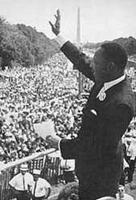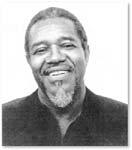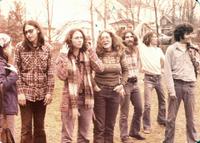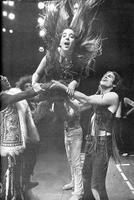(click on images to make them larger)
This post is by no means an attempt to 'recap' the Civil Rights Movement or the Vietnam war and its aftermath. Rather, it's a brief slice of my experience of both times in photo and text. This was prompted by requests by some readers to share more of my protest days after I posted a photo from the People's Revolutionary March in my commune blog post, further down. While I protested injustice and I protested the war, I don't see myself as a hard core protester. Had I been, I would've been down in Selma. I would've done more in general. With regards to the Vietnam part of the post, enough debates have raged about whether that war was 'right' or 'wrong'. This post isn't about that debate.
*******
 I still have a copy of this flyer. I was living with an interacial group, working and studying in Manhattan the summer before I attended graduate school when this march was planned. Little did I know when I read this flyer and decided to attend that it would attract such massive numbers of people, estimated as high as 300,000 or more to Washington that day, or that it would become such a historical event. I rode down on a chartered bus from Manhattan. What struck me with most impact was the joy I saw in the faces in the crowds extending from the Monument to the Lincoln Memorial. People were laughing, crying, hugging...That day, we believed anything was possible.
I still have a copy of this flyer. I was living with an interacial group, working and studying in Manhattan the summer before I attended graduate school when this march was planned. Little did I know when I read this flyer and decided to attend that it would attract such massive numbers of people, estimated as high as 300,000 or more to Washington that day, or that it would become such a historical event. I rode down on a chartered bus from Manhattan. What struck me with most impact was the joy I saw in the faces in the crowds extending from the Monument to the Lincoln Memorial. People were laughing, crying, hugging...That day, we believed anything was possible. Our group living tied into the whole experience. We didn't form friendships based on race, as might have been expected, but on compatablity. For me, that made the summer program a success.
*********
 Joan Baez, Bob Dylan, Peter Paul and Mary were among the singers who preceded Martin Luther King's speech.
Joan Baez, Bob Dylan, Peter Paul and Mary were among the singers who preceded Martin Luther King's speech.*********
 Martin Luther King was the last speaker of the day, his I Have A Dream speech becoming a hallmark in freedom speeches over the years. I still remember how he mesmerized the crowds that day. A marvelous orator. A man who believed his dream would come true in his lifetime. He amazed me.
Martin Luther King was the last speaker of the day, his I Have A Dream speech becoming a hallmark in freedom speeches over the years. I still remember how he mesmerized the crowds that day. A marvelous orator. A man who believed his dream would come true in his lifetime. He amazed me.My father was school superintendent in the South and in charge of carrying out integration in his schools when I attended the March. Already, he and my mother were receiving death threats and I remember him asking me that, if I went, to avoid any TV cameras, as it could make his situation even more dangerous. The irony of his situation is that both were long-time church members and my mother had to stop singing in the church choir, she received so much ostracism whenever she entered the choir loft. My opinion? The churches should have been the first to integrate and support the movement. Not!
*******
 I met Claude Brown at a Menningers Party at APA in Washington in the early seventies. By then, his Manchild in the Promised Land had been a smashing hit. I loved that book. He and I began talking and couldn't stop, so he invited me to spend the next day with him, driving around Washington as he visited his old radical buddies from his Howard University days. It was a shock to read that he died a few years ago in his early sixties. He was a charismatic man, a brilliant man who survived a hellish beginning and lived to tell about it. We shared the day, had a wonderful time, said our goodbyes and I never saw him again.
I met Claude Brown at a Menningers Party at APA in Washington in the early seventies. By then, his Manchild in the Promised Land had been a smashing hit. I loved that book. He and I began talking and couldn't stop, so he invited me to spend the next day with him, driving around Washington as he visited his old radical buddies from his Howard University days. It was a shock to read that he died a few years ago in his early sixties. He was a charismatic man, a brilliant man who survived a hellish beginning and lived to tell about it. We shared the day, had a wonderful time, said our goodbyes and I never saw him again.*******
Vietnam Days!!

Photo courtesy of Gary Jacobson from his Vietnam pages. Both my husband and his brother were in Vietnam, but I have no photos from Vietnam from either of them_only shots from refueling trips to the Philippines and R&R in Hong Kong.

My husband was a junior officer on a supply ship, the USS Genesee, this side of the DMZ. The one time they had to go up into the river, they were shelled. I remember his letter...'they were trying to kill me...they were trying to kill me'. Two men were killed and a shell destroyed the officer's mess room. They were fortunate that they didn't lose more. This shot is taken from a naval archive website of the ship in port in 1969 upon its return from Vietnam right after we left Hawaii.An account of the shelling is found HERE.
His brother was in the jungles but had no night patrol since he was made company clerk, being the only man who could type. It was from him that I heard the worst stories...kids and women lobbing grenades, his buddies going out and not coming back or coming back with ears strung on their belt; the heads on poles, the fragging of unpopular officers. Stories so painful I could hardly bear to hear them. I couldn't imagine living them. That was really when I knew I had to do whatever small things I could do to stop the war and bring these men home. As Jon Voight said in Coming Home (rephrased), 'we not only had to live with what was done to us, but what we did over there'. Killing leaves a mark that's hard to leave behind.
*******

My part in the protests came by writing endless letters and, finally, attending the People's Revolutionary March in Concord, which is pictured in my commune blog below and again here. I didn't take any photos of the march, itself. I don't know that any of our individual acts made any difference, but, overall, the mood of the country was not one to support war and so it eventually ended. The suicide rate of Vietnam vets has already outnumbered those killed in the war.
At the time, most protesters blamed the Vets. Now we know this was inexcusable. I knew it then, having loved men in that war, but sometimes insight comes late. In general, it was a time of protesting everything. Bonfires were held for draft card burning. Bras were burned or not worn. Women refused to shave their legs or under their arms. Men refused to cut their hair.

Hair burst on the scene as a musical in San Francisco, which I saw in 1969 enroute from Honolulu to Newport, while the Beatles sang about Lucy in the Sky With Diamonds. Timothy Leary and Richard Alpert were transforming themselves via LSD into Gurus at Harvard (and were eventually fired). Living in Boston, I had one foot in that world and the other foot in the world of my work and men with shorter hair and women who wore bras and shaved their legs. It was a crazy, confusing, unsettling time, but I wouldn't trade being a part of it for anything.

10 comments:
Thanks, Michael
His speech moved me like not many others have since. He was an amazing man. I'm glad I was able to attend, too, and be part of history in the making.
Martin Luther King was an amazing man, that speech INCREDIBLE. I was 10 when this happened, and in high school when busing and desegregation finealy began in our area.
Though our school never suffered the violence other areas experienced, we (and there were very few) who crossed racial lines were severely ostracized, a small price to pay retrospectively for openness- it is priceless.
It seemed at the time a large price to pay, being a tender 15, ridiculed and left with few friends. A few years later with maturity I realized I'd left nothing behind, those 'friends' weren't people I wanted to have in my life anyway.
Hi Ginger
I agree. While my parents received death threats and my father took the precaution of buying a hand gun for mother to keep in the house at night when he was at Board meetings, when the integration occurred, there was no violence. This was a small Southern town. A training program was set up for some of the Black teachers who hadn't benefited from good colleges, some of whom barely knew how to spell (telling you what kind of education the Black segment of town was receiving). Ironically, integration was finally set into place almost ten years later in Boston when I was living there and the Irish were the most upset. They raised bloody hell, with protests in the street and some violence. I had thought that a northern cosmopolitan area would've been MUCH easier, but no.
This is wonderful Pris - you really were present at history in the making: 'I have a dream today, my friends...' - who could forget that voice? Here in UK, we watched it all on TV, of course; just think, as I watched Martin Luther King on the podium, and the camera swept around that huge crowd, I might have see you as a dot somewhere in the distance. Perhaps a little shiver went through me - who knows? - and I thought 'There's my future friend and poet-extraordinary, Pris Campbell!'
This post, and the Kerouak poem, all connect with me, as I've just finished reading 'On The Road'. And the whole 'Nam thing - we weren't involved, of course, but I've always felt that that was the time when America finally lost its innocence - what was left after WWII.
The so-called 'Special Relationship' between our two countries comes and goes as dictated by expedience; but the common bond between the people is always there. If the WWW has done nothing else, it has given us all a greater understanding of each other. Thank you for posting this archive Pris - a valuable contribution to the Blogging World!
G
What a nice comment. Yes, isn't it strange that you were watching on tv while I was a dot in the crowds the cameras scanned? And while any of the wars we've been in were horrid experiences, there was just something about Vietnam...the groping through those jungles, the women and children being part of the fighting, the Vet treatment afterwards and the continued denial that Agent Orange hurt our men and their children through altered genetics.
I agree with all that it's a Great post! Pity that the enlightenment of the then did not manifest fully in the now. We still have many fences to climb and generationally instilled hard headedness to battle. My husband left the USA because of the attitudes he was experiencing when he got out of the service in 1968. I am glad that he left because that's how I met him. In Canada it was assumed by most that he was one of the many draft dodgers that came our way back then. I am a naturalized American now and I am the democrat while my husband is the republican. He did not vote for W., so I must be rubbing off a little bit. I love this country and I hope that one day everyone is really equal and free.
Hi mouse
I can totally understand why he needed to leave then. The hatred some people showed the Vets...well, it was just incredible.
Pris, so glad you posted this. Amazing intersections of lives. I was a bit too young to make it to the March on Washington (I turned 8 in 1963), though was old enough to plunge in to the incredible events of those years a little later when I was in high school.
I went to a racially integrated junior high school in Minneapolis, and in 1968 the day after Martin Luther King was shot, nearly all of the black students stayed away from school for the day. Eventually around mid-morning the school administration let everybody else go home. It left an indelible memory with me -- helping me to see close-up the profound effect a person of strong principle and conscience can have on many other people.
I started writing poems in 1968. At the first anti-war demonstration I attended -- fall 1969 -- someone read Robert Bly's poem "Counting Small-Boned Bodies" (not Robert Bly reading it, it was someone else). This was in front of the Federal Building in Minneapolis on a clear bright fall day, in 1969. My high school let us have the day off to go to the anti-war march if we got a note from our parents asking us to be excused. (!!!) (I did.)
The largest anti-war march I was in was in May 1970. It started at the U. of Minnesota campus, and after listening to some speakers we started walking -- weaving a long path to the campuses of several small private colleges in Minneapolis and St. Paul, then past the governor's mansion, and finally to the state Capitol (downtown St. Paul) at around 5 in the evening. Every time I looked back to see how many people there were it was an endless river filling the street as far as I could see. (The reliable estimates ranged around 50,000 people give or take.) It was a day of coordinated demonstrations across the country, similar scenes all over the place. The Vietnam Veterans Against the War were among the organizations at the head of the march.
I was just young enough that by the time I was draft age, the government had stopped inducting people into the military, though we still had to register. I filed for -- and received -- formal, legal Conscientious Objector status, so if the draft resumed (my lotter number was 2!!) I would have been assigned to some kind of civilian "alternative service" work in the U.S., probably (in Minneapolis) working in a hospital or nursing home.
(I've always wanted someone to gather a book of accounts of some of the more "creative" ways people avoided the draft back then -- I've heard a few pretty wild stories from people over the years -- I was fortunate to have access to draft counseling advice, and didn't have to be "creative" about it.)
Claude Brown's Manchild in the Promised Land was assigned reading for a class I took in college (Winter 1974). Great book.
Too much more, and I don't want to hog the comment box any longer-- again thanks for the wonderful post.
Lyle
You didn't hog the box. I was fascinated to read about your experiences during this time, too. I'm glad you were able to get conscientious objecter status. I remember when my first husband to be's draft number was high, about the only option he could think of was to enroll in OCS and become a junior navy officer and HOPE he wouldn't be in the worst of it. Since he did get lucky and was on a gasoline supply vessel, they didn't have to kill anyway, but he still came back changed, in my opinion. I wish more men had better advice. Most I knew were told that you had to have a long standing religious affiliation, such as Quaker or Mormon, to be even considered for C.O. status.
An online Vietnam Friend sent around the link I'm posting up top today along with the question: will we ever learn??
Post a Comment